Lyonesse by Penelope Skinner takes a while to get going. The central character, Elaine, is a washed-up British actress (Kristin Scott Thomas) who lives in a crumbling mansion in Cornwall where she dreams of making a comeback as a movie star. She contacts a clueless researcher, Kate, and asks her to drive down from London to write a screenplay about her reclusive existence in the sticks. Kate meets Chris, a mixed-race lesbian poet who works as Elaine’s chauffeur, factotum, and companion. Chris also keeps the moths away from Elaine’s collection of 12 dead parrots, stuffed and caged.
After nearly an hour of stage time, Elaine is ready to narrate her life story with Chris on duty as her stagehand. Chris is necessary because Elaine delivers her story standing on a makeshift rostrum decked out with fairy lights, dressed as a carrion crow. These details suggest a playful satire about the pretentious delusions of ageing thesps but this show takes itself rather seriously. It’s a piece of absurdism that doesn’t know how absurd it is. The structure is feeble. Bits of information are delivered in one scene and repeated in the next. We’re twice told how to pronounce ‘Lyonesse’. The characters rarely interact properly because the script asks them to share gossip about off-stage characters who are hundreds of miles away or dead.
Here’s a sample of the snappy dialogue. While Elaine is playing the Moonlight sonata, Kate says, ‘The Moonlight sonata’ and Chris replies, ‘Yes’. Script editors are hired to excise dross like this. And the narrative has no internal coherence. Elaine claims to adore performing but she can’t explain why she worked in a sweetshop for decades while her husband directed prize-winning films and bagged a lifetime achievement award in Hollywood. Did he not want to help her? And why would the biography of a forgotten British actress attract the interest of movie hotshots in LA?
Kate, the half-witted intern, starts off as a researcher but quickly gets promoted to three key roles: screenwriter, director and executive producer. Films aren’t made like this. Elaine, the ageing luvvie, must publish her memoir as a book and then produce it on stage for an audience of potential film investors. But instead she spouts brainless nonsense about selling the screen rights from scratch. The other characters aren’t brave enough to tell her she’s nuts.
The experiences of Kate (Lily James) mirror the historic sufferings of Elaine. Kate is married to an ambitious film director who lacks sensitivity and thinks only about himself. And although Kate nearly died giving birth, he insists that they have tons of sex and add a second child to their family. Elaine and Kate are identical types: low-IQ losers who ask their husbands to make big decisions for them and then complain of mistreatment and betrayal. Real women are more impressive than these pinched and derisory stereotypes.
Elaine might easily be a spare character from The Confessions by Alexander Zeldin. This dramatised monologue follows the life of an Australian dropout, Alice, whose existence is both pointless and repetitive. It’s like watching a crab trying to escape from a bucket. Born in 1940, Alice blossoms into an attractive blonde who encounters various rotters, cads, cheats and sex-attackers. But she never learns how to distinguish a decent chap from a beast. After flunking college, she teaches potato-painting at a primary school and then flees to Europe where she describes herself as an art historian, albeit one who rhymes ‘Louvre’ with Vouvray. Her friends are hysterical misfits and show-offs.
After being raped by a university colleague, she experiences a pornographic hallucination in which she removes all her clothes and slips into a bath alongside her assailant, who is also naked. Is this Alice’s unconscious mind purging the stain of rape from her life? No idea. The opaque dialogue offers no clues. Later, there’s another pornographic fantasy set in her local library. She’s 42 by now, and desperate to start a family, so she propositions an overeducated vagabond in the German philosophy section. She suggests that they go to bed together, whereupon his jaw falls open and his wet grey tongue lolls out. ‘My luck is improving,’ he drools.
The ageing sperm-donor comes up trumps and Alice gives birth twice. One of her children is the show’s writer. That explains a lot. The production is based on the unpublished witterings of a rootless old hippy chick who lacks any character or ambition, and who seems incapable of framing a single utterance worth recording. The National has devoted its second-largest venue to a show for two customers: the writer and his mum. They probably got their seats for free. Stay at home. Watch bark grow. It’s more exciting than this vanity project.
Got something to add? Join the discussion and comment below.
Get 10 issues for just $10
Subscribe to The Spectator Australia today for the next 10 magazine issues, plus full online access, for just $10.
You might disagree with half of it, but you’ll enjoy reading all of it. Try your first month for free, then just $2 a week for the remainder of your first year.

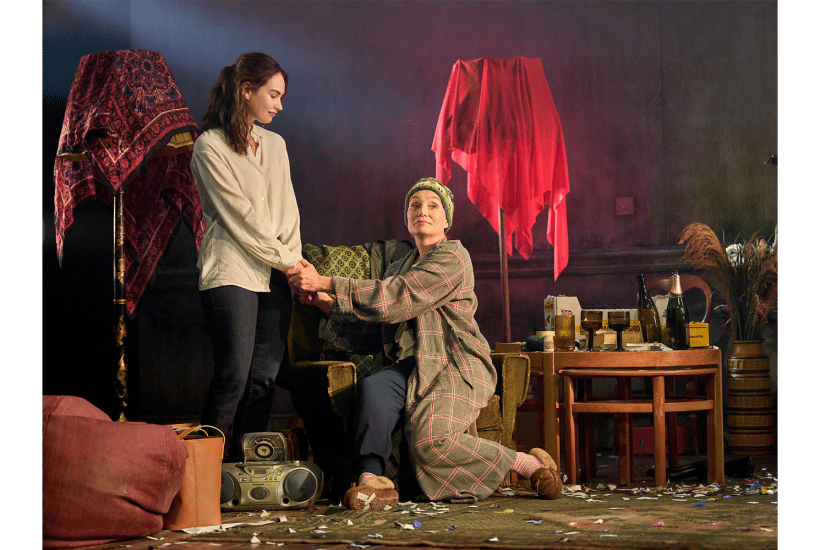
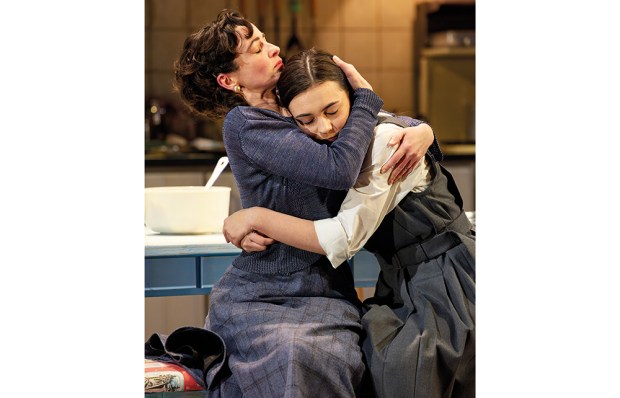
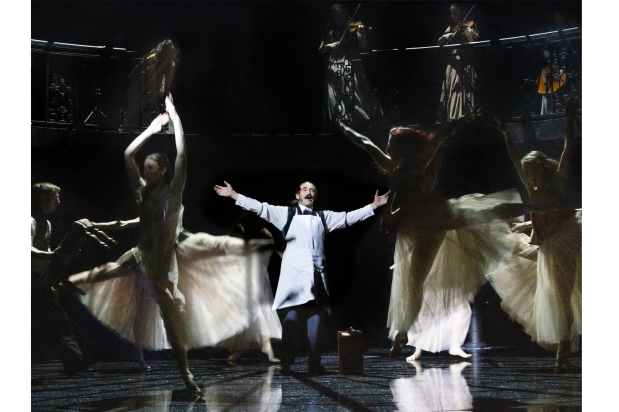
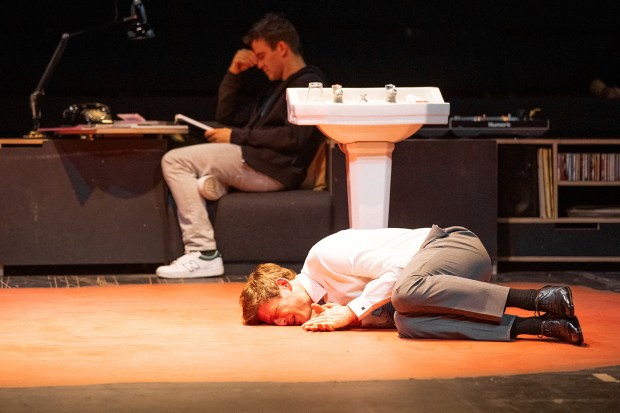
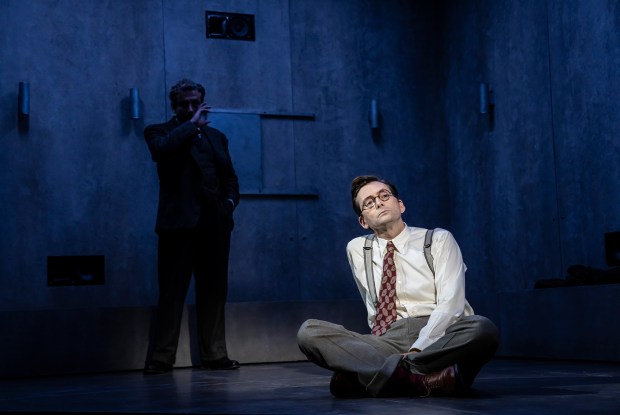

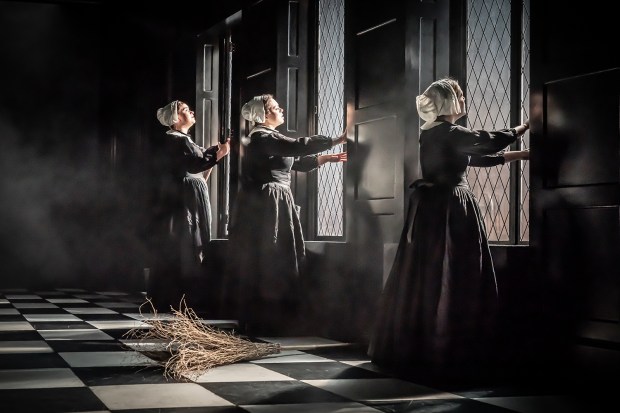






Comments
Don't miss out
Join the conversation with other Spectator Australia readers. Subscribe to leave a comment.
SUBSCRIBEAlready a subscriber? Log in